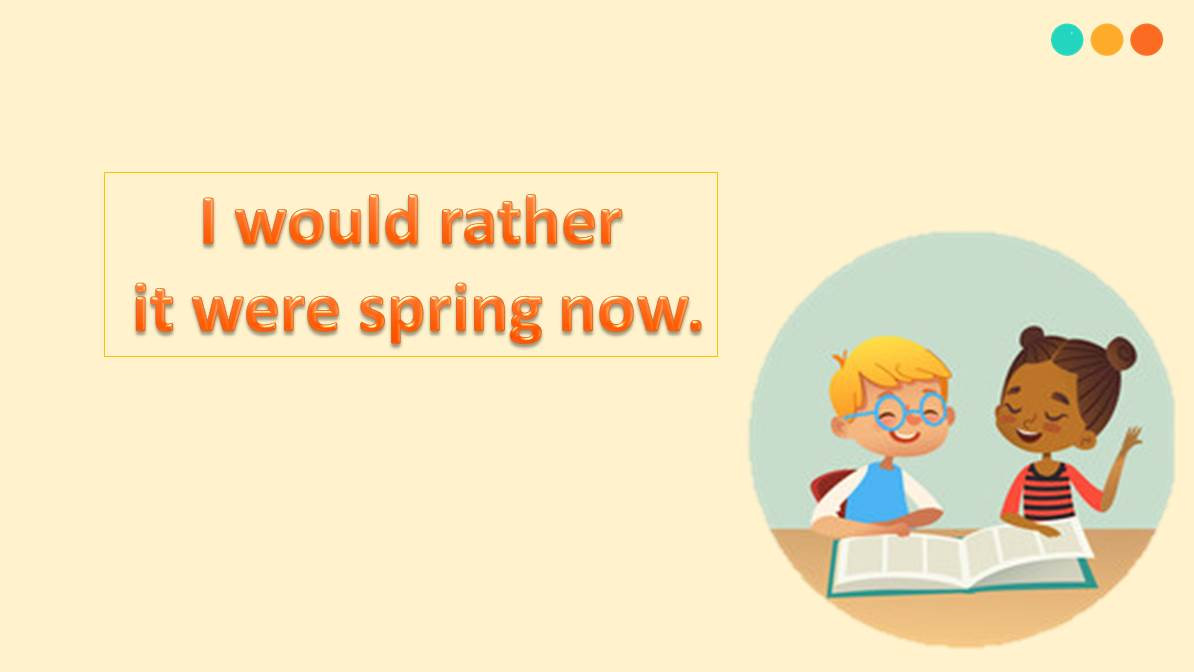Hypothetical sentence
In English communication, to express wishes about what someone will do, instead of using simple structures like I hope, I want,... we can use subjunctive structures at the lower level. more advanced.
1. What is a hypothetical sentence?
Hypothetical sentence (Subjunctive), also known as command sentences, is a type of sentence used when the speaker wants someone to do something. The subjunctive structure has a commanding nature and does not express coercion like an imperative sentence.

What is a hypothetical sentence?
For example:
-
The doctor suggested that Tom stop smoking.
-
It is necessary that she buy a map before going on a trip.
2. Types of hypothetical sentence structures
Subjunctive structures are a difficult part of English grammar because of the variety of uses and different structures for each case. Let's summarize the most common subjunctive sentence forms to better understand this type of sentence.
2.1. Subjunctive sentences with “would rather that”
In English, the subjunctive structure with would rather that is used in the following cases:
Expressing events in the present (present subjunctive):
Used when the first person wants the second person to do something (but doing it or not depends on the second person). Then, the verb in clause two is put in the infinitive form without "to" and put not before the infinitive without "to" with the negative form.
Structure:
S1 + would rather that + S2 + [verb in simple form]…
The structure “would rather that” goes with the present tense: carries the hypothetical present meaning and wishes for the event to happen in the future.
For example:
-
-
My sister would rather that I do the qhousework tomorrow.
-
He would rather that his daughter not go home late.
-
Attention: Today's spoken grammar, especially American grammar, allows omitting that in this structure while still retaining the subjunctive form.
Describes events that are contrary to current reality
The verb after the second subject will conjugate in the simple past. If using the verb to be, the conjugation is were in all persons.
Structure:
S1 + would rather that + S2 + [verb in simple past tense] …
The structure "would rather that" goes with the past tense: carries the meaning of hypothetical past and wishes for things to happen in the present.

For example:
-
- Linda would rather that her father worked fewer 10 hours per day as he used to.
Explain: Linda wants her father to work less than 10 hours a day like before. In fact, her father works 10 hours a day.
-
- I would rather that today were Sunday.
Explain: I want today to be Sunday.
Attention: If you want to establish can be negated use didn’t + verb or were not after subject two.
For example:
-
-
Linda would rather that her father didn’t work more than 10 hours per day.
-
I would rather that today were not Sunday.
-
Describe events that are contrary to reality in the past
The verb after the second subject will be conjugated in the past perfect form, in the negative form it will be in the form had not + PII
Structure:
S1 + would rather that + S2 + past perfect …
The structure “would rather that” goes with the past perfect tense: carries the meaning of past perfect assumptions and wishes in the past..
For example:
-
- Tom would rather that he had finished the work yesterday.
Explain: Tom wanted him to finish yesterday's work.
-
- Bill would rather that his girlfriend hadn’t gone back her promise.
Explain: Bill wants his girlfriend not to break her promise.
Attention: Modern grammar allow to omit “that” In some hypothetical sentences, use would rather
2.2. Subjunctive sentences with verbs
In English grammar, we can recognize the subjunctive structure through some verbs followed by a "that" clause such as:
| Verb | Means | Verb | Means |
| advise | Advise | ask | request |
| command | obligatory | demand | request |
| desire | dream | insist | persistent |
| propose | propose | recommend | suggestion |
| request | request | suggest | suggest |
| urge | quickly | move | control |
What is a hypothetical sentence?
For example:
-
The doctor advised that she stop staying up too late.
- The teacher requires that all his students learn this lesson.
2.3. Subjunctive sentences with adjectives
Adjectives are used in subjunctive structures to express important and urgent meanings. These adjectives are followed by a “that” clause.
| Adjective | Means | Adjective | Means |
| Advised | be advised | Necessary | necessary |
| Important | important | Imperative | urgent |
| Crucial | Cardinal | Desirable | desirable |
| Vital | Survival | Best | the best |
| Urgent | urgency | Essential | necessary |
| Recommended | recommended | Obligatory | obligatory |
What is a hypothetical sentence?
Structure:
It + to be + adj + that + S + V-inf
For example:
-
It was urgent that Mary leave for the office at once.
- It is best that Vu find his key.
2.4. Subjunctive sentences used with “It is time”
The subjunctive structure with "It's time" is used to express the urgency of an action that needs to be done at the time of speaking. We can use two structures with it’s time as follows.
Structure:
- It’s time + S + V-ed/P2
(it's time for someone to do something)
- It’s time + (for sb) + to + V-inf
(it's time for someone to do something)
For example:
-
It’s time Linh left for the office.
-
It’s time for our children to go to school.

